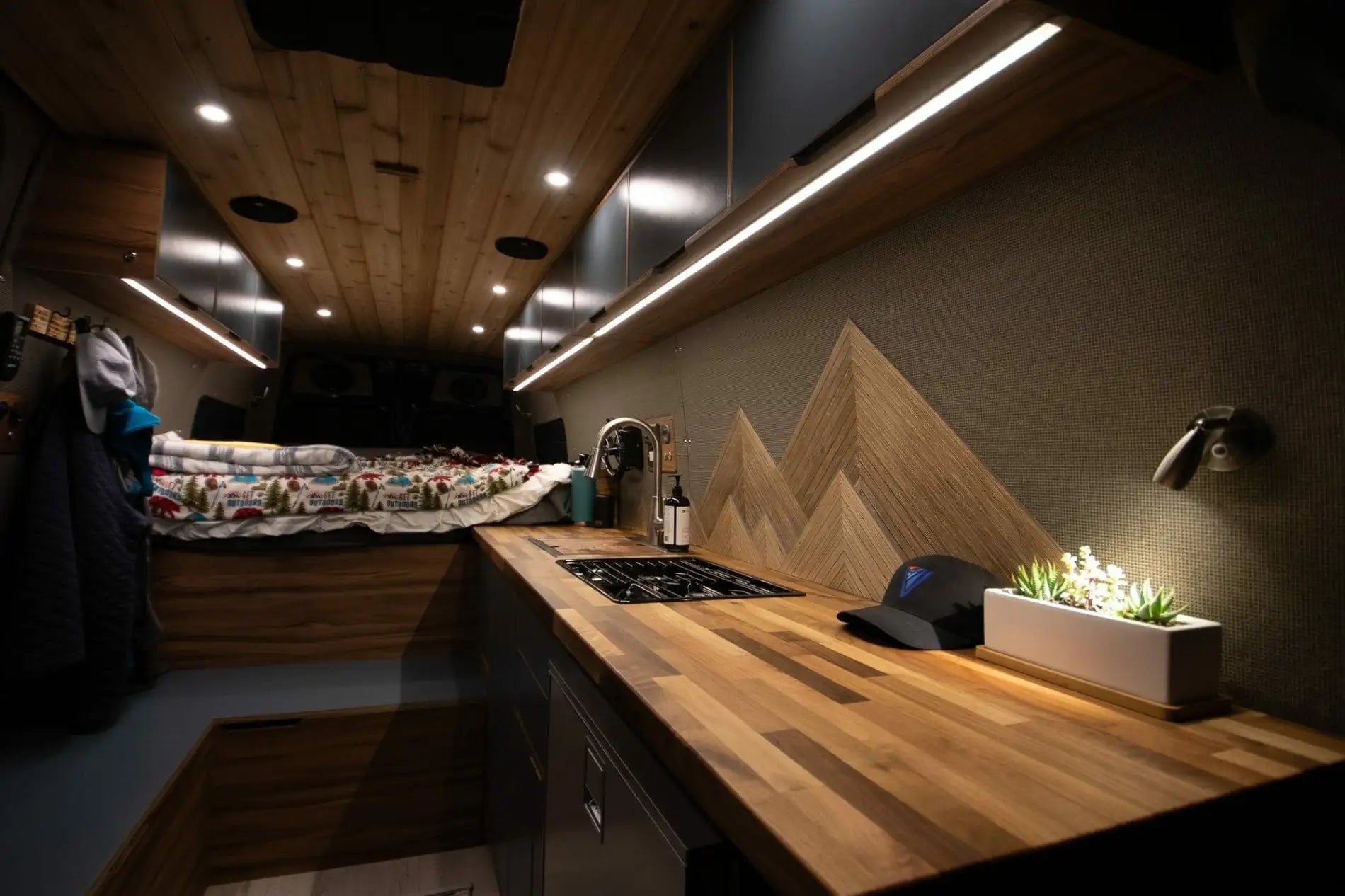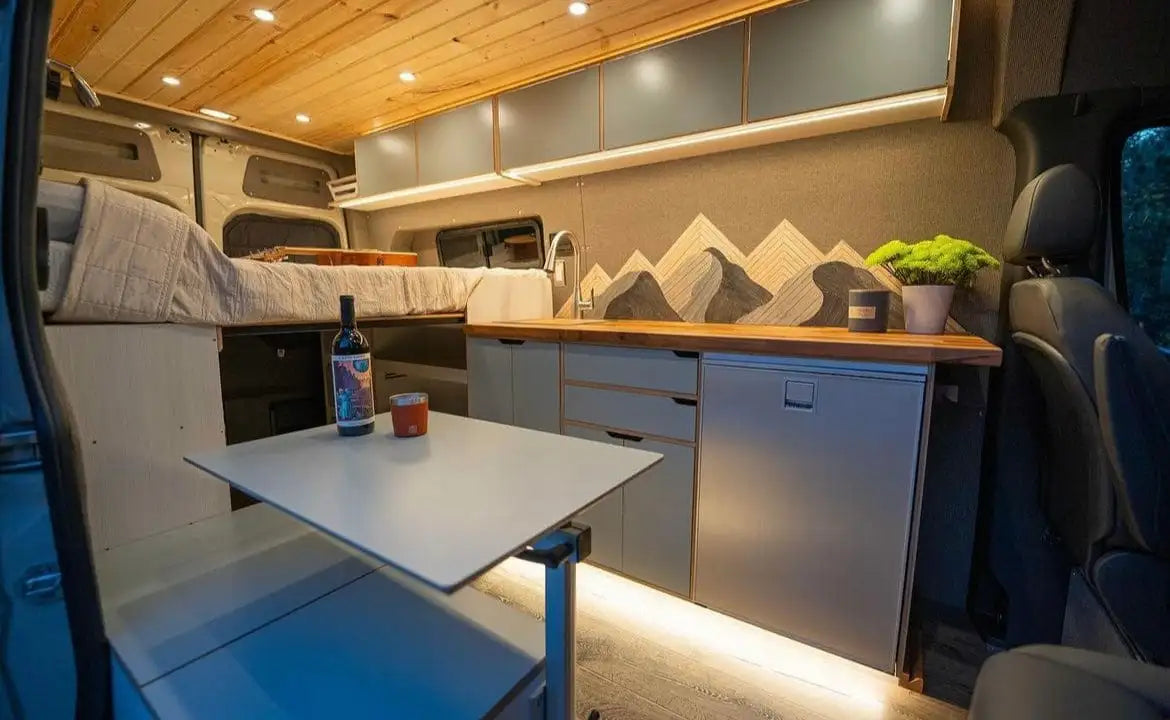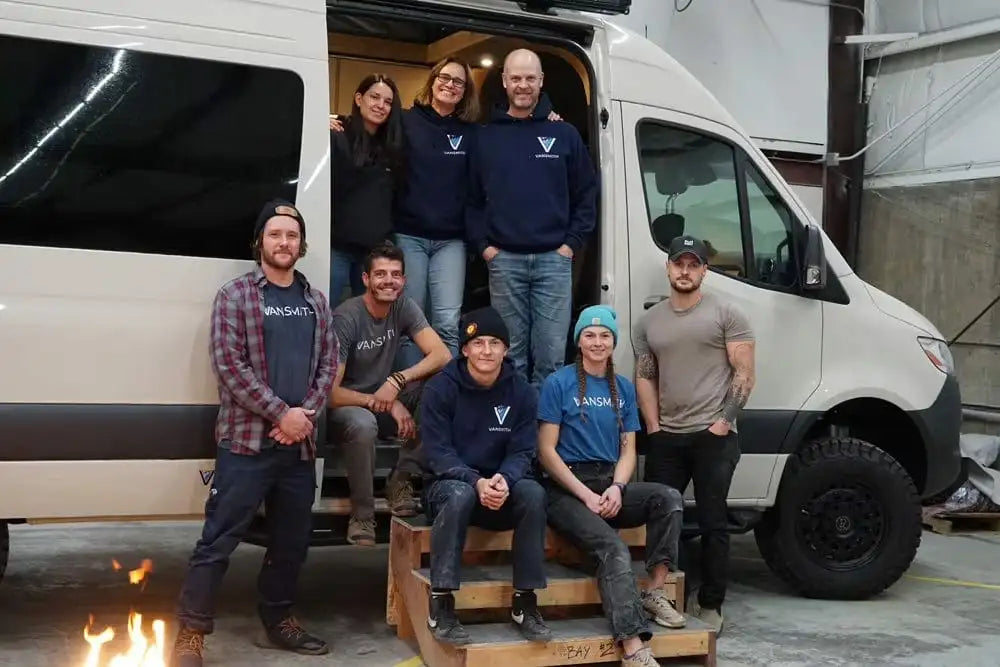What Is a Class B Camper Van?
If you've ever asked, “What is a Class B camper?”—you’re not alone. Class B camper vans are the smallest motorized RVs on the market, but don’t let their compact size fool you. These nimble road warriors are packed with everything you need for the ultimate vanlife experience—kitchen, bed, bathroom, and storage—all within a van chassis you can park nearly anywhere.
At The Vansmith, we’ve spent over a decade helping adventurers customize their vans to fit their lifestyle. Whether you’re chasing snow in the Rockies, surfing the coast, or just looking to live life more freely, a Class B motorhome is your gateway to exploration.
Key Characteristics of Class B RVs
Let’s break down what makes a Class B RV unique.
Built on a standard van chassis (Sprinter, Transit, or Promaster)
- Length: Typically 17–22 feet
- Height: Around 9–10 feet
- Sleeps: 1–4 people
- Features: Kitchen, bed, small bathroom or portable toilet, storage, solar/electrical systems
Despite their size, Class B motorhomes offer many of the same features as their bigger cousins—just scaled down with thoughtful, efficient design. At The Vansmith, we tailor each van to your vision, ensuring it fits your needs and reflects your style.
Common Uses for Class B Motorhomes
Wondering how most people use these vans?
- Weekend getaways to national parks or state campgrounds
- Full-time vanlife with off-grid solar and composting toilet setups
- Adventure basecamps for skiing, climbing, biking, or hiking
-
Remote workspaces with mobile Wi-Fi and cozy interiors
Class B RVs are perfect for solo travelers, couples, or small families who value mobility and flexibility. They’re also ideal if you want to just drive and go—no towing, no special hookups, no fuss.
What Are the Different Classes of RVs?
To really understand what is a Class B RV, it helps to see the full picture.
Motorized RVs (Motorhomes)
- Class A: Bus-style RVs, 25–45 feet. Great for luxury, not so great for city driving.
- Class B: Van-style RVs, 17–22 feet. Most versatile and easiest to drive.
- Class C: Truck cab with an overhang bed. 20–35 feet. More space, less maneuverability.
Towable RVs
- Travel trailers
- Fifth-wheel trailers
- Pop-up campers
- Teardrop trailers
So, what are the classes of RVs? They're all about size, features, and how they move. Class B hits the sweet spot—compact, comfortable, and adventure-ready.
Class B vs. Class B+ vs. Class C: What’s the Difference?
- Class B: True van chassis. Smaller, easier to park, better fuel efficiency.
- Class B+: Hybrid between B and C. Wider body, sometimes more storage or amenities.
- Class C: Larger, truck-like front end with over-cab sleeping area.
If you’re comparing the difference between Class B and C motorhomes, think of it like this: Class B feels like driving a van. Class C feels like driving a truck.
What Are the Advantages of a Class B Motorhome?
Pros:
- Easy to drive and park (fits in most standard parking spots)
- Better fuel efficiency than Class A or C
- Ideal for stealth camping or city travel
- Built-in features for off-grid living
- Lower maintenance and repair costs
- Can double as a daily driver
At The Vansmith, we focus on innovative designs that bring comfort to your journey, no matter where you park. Every van we build is packed with smart layouts and quality components—because every square inch counts.
What Are the Disadvantages?
Cons:
- Limited interior space (especially for families)
- Smaller fresh water and grey water tanks
- Less storage than larger RVs
- Pricier per square foot
So, why is Class B so expensive?
It comes down to engineering. Cramming a kitchen, bed, and bathroom into a tiny footprint takes skill—and quality parts. Plus, it’s all built on a durable van platform that can handle rugged roads and years of use.
Do You Need a Special License to Drive a Class B RV?
Nope. One of the best perks of a Class B camper van is you don’t need a special license. In all 50 states, your regular driver’s license is enough.
Do you need a Class B license for a camper van? Only if you're driving a very large RV over 26,000 pounds—which a Class B never is.
Customize Your Van With The Vansmith
We believe your van should feel like home. That’s why we tailor every build to your needs. Want extra gear storage for skis? Need a toilet setup that works for long off-grid trips? Prefer bamboo finishes and wool insulation for a sustainable touch?
We’ve got you covered.
Our team works one-on-one with you to customize your van—from layout to lighting. It's part of our commitment to personalized attention and support, so you feel confident before and after you hit the road.
Sustainability in Every Van
We believe that traveling responsibly means building responsibly too. At The Vansmith, we use:
- FSC-certified bamboo cabinetry
- Wool insulation
- Low-VOC finishes
- Energy-efficient lighting and appliances
Whether you're going full-time or weekend-only, you can explore with purpose—and leave the lightest footprint possible.
Conclusion: Is a Class B Camper Right for You?
If you’re still wondering, “What is a Class B motorhome and is it right for me?”—the answer depends on your lifestyle.
Choose a Class B if:
- You want freedom without a steep learning curve
- You like going off the beaten path
- You value efficiency, style, and functionality
- You want a van that can keep up with your life, not slow it down
At The Vansmith, we build Class B vans with unmatched craftsmanship, ready to roam wherever you go. Built in Boulder, Colorado, tested in the wild, and made to last—these are vans with soul.
Ready to start your journey? Contact us or explore our in-stock vans. Let’s build something incredible together.
FAQs
-
What is considered a Class B camper?
A Class B camper is a fully self-contained motorhome built on a van chassis. It includes sleeping space, a kitchen, and often a bathroom.
-
Do you need a Class B license for a camper van?
No. You can drive a Class B RV with a standard driver’s license in the U.S.
-
Why is Class B so expensive?
Because it combines full RV features in a compact, high-performance space—using quality materials and engineering.
-
What are the cons of Class B RV?
Smaller living space, higher cost per square foot, and limited storage compared to Class C or towable.





